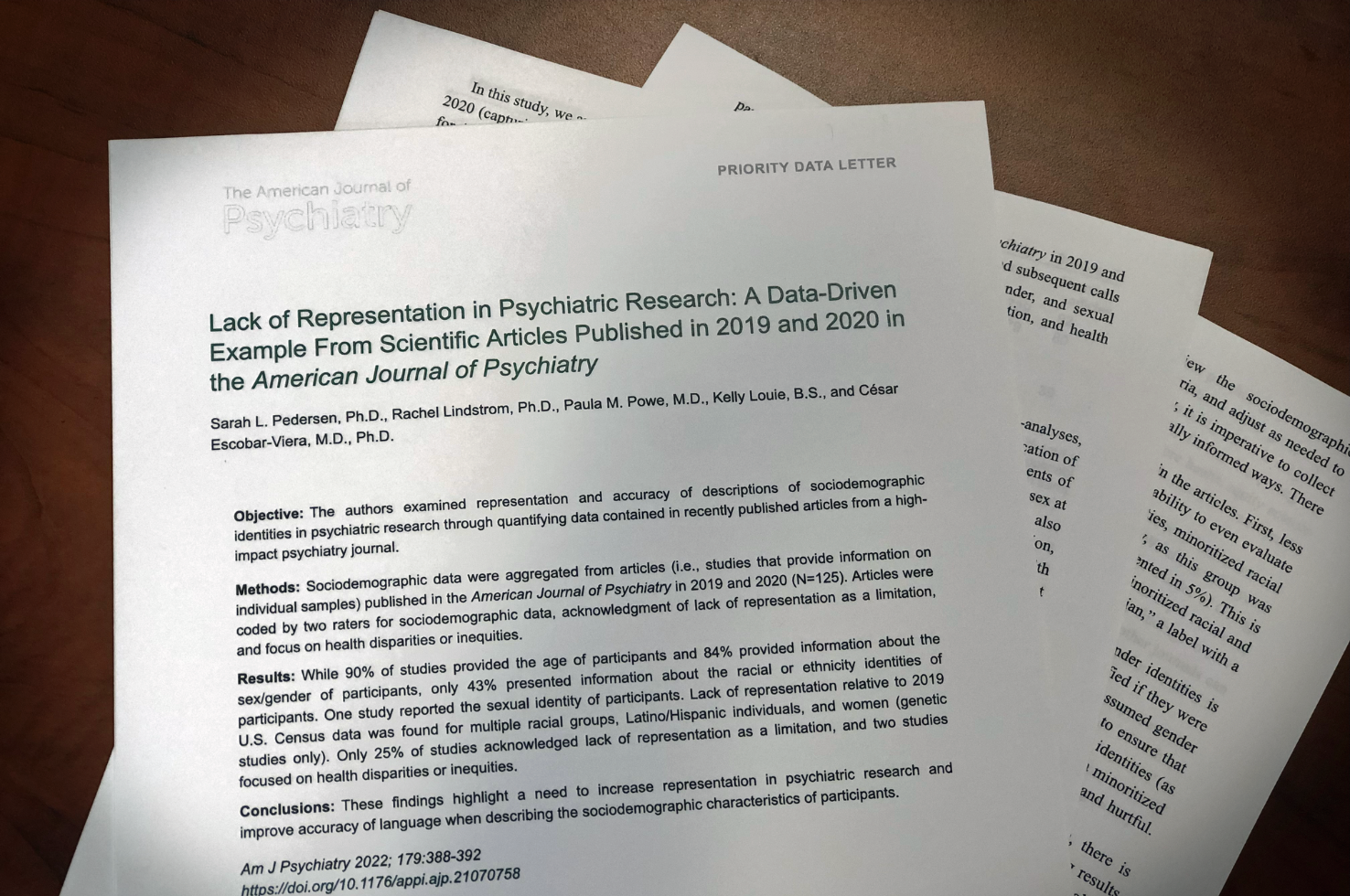Lack of Representation in Psychiatric Research: A Data-Driven Example From Scientific Articles Published in 2019 and 2020 in the American Journal of Psychiatry

How well is psychiatric research doing including diverse participants and reporting on sociodemographic characteristics of study samples?
A team of researchers from Pitt Psychiatry—led by Sarah Pedersen, PhD (Associate Professor of Psychiatry), and including Rachel Lindstrom, PhD (Senior Statistical Coordinator, Youth and Family Research Program); Paula Powe, MD (Assistant Professor of Psychiatry); Kelly Louie, BS (Research Specialist, Youth and Family Research Program); and César Escobar-Viera, MD, PhD (Assistant Professor of Psychiatry), examined sociodemographic data published in The American Journal of Psychiatry in 2019 and 2020 and highlighted the importance of increasing representation in psychiatric research.
We spoke with Dr. Pedersen about the recent study, published in The American Journal of Psychiatry, and how those findings may influence future psychiatric research.
How did you and your collaborators identify the need to analyze the sociodemographic characteristics of psychiatric research study participants?
While we have long known that lack of diversity in research is an issue, and that health equity research—research that examines health differences caused by socioeconomic or environmental factors—is less likely to be funded, reviews of the literature are either specific to one disorder/illness or focus on a more constrained examination of representation (e.g., only racial identity).
Currently, active debates address issues such as whether representation is improving and whether researchers are accurately describing their study participants. We embarked on this work to empirically test these possibilities with published data, establish a benchmark to inform the field, and track progress in psychiatric research reporting over time.
How did you analyze all of this data?
Our team reviewed 125 scientific articles from 2019-2020 that contained descriptions of human participants, and recorded the available sociodemographic data from all of them. Elements we looked for included description of racial and ethnic identity, and problematic categorization, such as groups labeled as other, nonwhite, or mixed. We were also interested in whether studies differentiated between gender identity and assigned sex at birth (99% of the studies did not!) and reported on sexual identity. We also coded the article as having a health equity/disparity focus or not (only two out of 125 did) and if the article mentioned generalizability concerns as a limitation.
What did you find, and what are the implications for future scientific research?
We found that minoritized racial and ethnic groups, especially Asian American and Latino/Hispanic participants, and female participants/women, were underrepresented in the articles we reviewed.
Our results also showed frequently missing descriptions of sociodemographic characteristics (only 43% described the racial or ethnic identities of the sample), prevalent use of inaccurate labels, and rare acknowledgment of lack of representation as a limitation (only 25% of articles included this as a limitation).
The current study revealed important and troubling implications for rigor and reproducibility. When we don’t actually know who is in the study, the conclusions may be compromised, and implications may not apply to people with minoritized identities.
The work we did significantly advances our understanding of representation and scientific language in psychiatric research. Further research that integrates the identities of authors, reviewers, and editorial board members and examines change over time in comparison to this baseline is needed. We hope that these results and conclusions encourage action and further discussion across all levels of the scientific community, including researchers, community members, institutions, journals, and funding agencies.
Lack of Representation in Psychiatric Research: A Data-Driven Example From Scientific Articles Published in 2019 and 2020 in the American Journal of Psychiatry
Pedersen SL, Lindstrom R, Powe PM, Louie K, Escobar-Viera C
The American Journal of Psychiatry, 179: 388-392 (2022) https://doi.org/10.1176/appi.ajp.21070758
